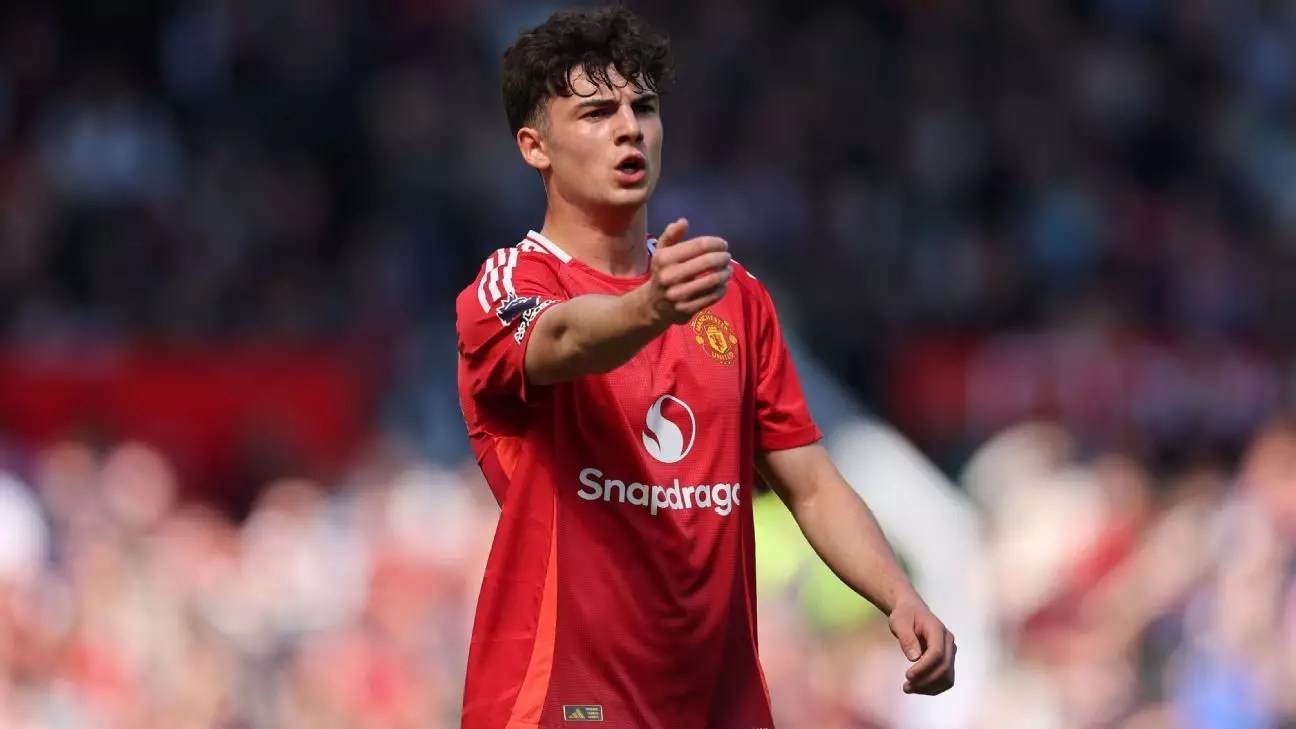In the heart of Manchester, a tale of juxtaposed fortunes unfolds within the walls of Old Trafford. Manchester United, with dreams of grandeur, now fights merely for survival amid a season marred by setbacks. The team’s recent 1-0 defeat against Wolves underscored a palpable sense of despair, yet it also illuminated a flicker of hope—one that emerges from the unlikeliest of scenarios. As the soundtrack of the season shifts towards the Europa League, a platform to redeem the faltering campaign, the focus now pivots not solely on the scoreboard but on the glimmers of promise found in the club’s youth.
A New Generation Steps Up
Amid the woes that have plagued Manchester United, the emergence of young talents presents a captivating subplot. Manager Ruben Amorim had little choice but to rotate and acknowledge the depth of his squad, fielding 20-year-old defender Tyler Fredricson for his senior debut during this crucial fixture. In regular circumstances, Fredricson wouldn’t have found himself thrust into such a high-stakes environment. However, injuries and the continuous rotation of players have paved the way for fresh faces to rise—bringing dynamism, vigor, and the willingness to seize the moment.
Fredricson’s display was anything but timid. Positioned within a back three, he exuded composure and tactical awareness rare for a debutant. His assertiveness was vital during critical moments, particularly when quickly neutralizing Wolves’ counterattacks. That he managed to maintain his footing amid the chaos of the game and navigate his responsibilities effectively is a testament not only to his talent but also to the potential that lies within United’s fold. The praises from Amorim echoed the sentiments of supporters who witnessed the birth of a potential star, hinting that this could be the beginning of a significant chapter in his burgeoning career.
Struggles of the Established Stars
While the introduction of young talent signifies hope, it starkly highlights the struggles of more established players within the squad, particularly striker Rasmus Højlund. With fourteen appearances under his belt but only a solitary goal to show, Højlund appears locked in a vicious cycle of self-doubt and frustration, typifying the challenges that have beset the team. The glaring misses he has endured, including a golden opportunity set up by Alejandro Garnacho, signal deeper issues within the attacking structure of United. Despite the tactical adjustments Amorim aims to implement, finding consistent offensive output has proven a gargantuan task.
Amorim’s perspective on the predicament is prudent; he acknowledges that while Højlund shoulders a heavy burden as a striker, the onus is not solely on him. As Amorim aptly points out, football is a collective endeavor, and the team’s inability to convert chances is a broader issue. The accountability must be shared, demanding a united front from the players in their bid to reclaim their legacy and restore pride to the club.
Unraveling the Season’s Consequences
The repercussions of this season have cast an ominous shadow over the club’s ambitions, leaving the specter of relegation whispers echoing throughout their fanbase. United’s 15 league defeats mark a sobering statistic that the club can hardly brush aside. The historic significance of these statistics looms large—facing the prospect of finishing outside the top tier of English football is a nightmare that may very well become a reality if current trends persist.
The battle for survival isn’t just about avoiding embarrassment; it’s about cultivating stability, especially as new elements begin to integrate into the first team. The recent resurgence by Wolves, who have managed to revive their own season after a dreadful start, underscores the intensity and unpredictability of the competition. Manchester United must not only navigate their own struggles but also be acutely aware that others are improving against the backdrop of their decline.
Glimmers of Resilience and Ambition
Amidst the fracturing ambitions and the simmering anxieties, there remains a trace of hope that persists within the depths of Manchester United’s crisis. The nod towards integrating youth, and recognizing their potential, infers that not all is lost. The upcoming Europa League semifinals present an avenue for redemption, a chance to transform this tumultuous season into something of merit. Amorim’s ability to balance youthful exuberance with the expectations of entrenched players may define not just this season, but set the trajectory for years to come.
In these times of strife, the overarching theme for Manchester United must center around resilience, collective responsibility, and an unwavering commitment to progress. As the team prepares for their defining moments ahead, the journey toward recovery will undoubtedly shape their identity. Each game poses not just a test of skill, but a pivotal opportunity to rebuild a legacy, reminding fans of the indomitable spirit that is, and has always been, Manchester United.


Leave a Reply